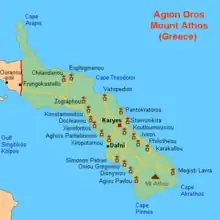Dionysiou Monastery
Dionysiou Monastery (Greek: Μονή Διονυσίου) is an Eastern Orthodox monastery at the monastic state of Mount Athos in Greece in southwest part of Athos peninsula. The monastery ranks fifth in the hierarchy of the Athonite monasteries. It is one of the twenty self-governing monasteries in Athos, and it was dedicated to John the Baptist.
Ιερά Μονή Διονυσίου | |
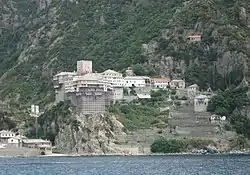 External view of the monastery | |
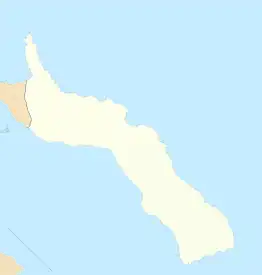 Location within Mount Athos | |
| Monastery information | |
|---|---|
| Full name | Holy Monastery of Dionysiou |
| Order | Ecumenical Patriarchate |
| Established | mid 14th century |
| Dedicated to | John the Baptist |
| Diocese | Mount Athos |
| People | |
| Founder(s) | Dionysios |
| Prior | Archimandrite Elder Petros |
| Important associated figures | Nicodemus the Hagiorite |
| Architecture | |
| Style | Byzantine |
| Site | |
| Location | Mount Athos, Greece |
| Coordinates | 40°10′04.88″N 24°16′25.91″E |
| Public access | Men only |
History
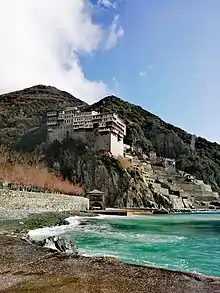
.jpg.webp)
The monastery was founded in the 14th century by Saint Dionysius of Korisos, and it was named after him. The brother of Dionysius of Korisos was the metropolitan of Trebizond at the time. Alexios III Komnenos of Trebizond was the main benefactor of the monastery during its founding. His chrysobull from September 1374 is currently kept in the archives of Dionysiou Monastery. A passage from the chrysobull states that:[1]
For all emperors, kings, or rulers of note have built monasteries on Mount Athos for their eternal memory; and since the emperor of Trebizond surpasses many of them, he too should add a new foundation in order to live eternally in the memory of the people and to enjoy unending pleasures of the soul.
By the end of the 15th century, the Russian pilgrim Isaiah confirms that, the monastery was Serbian.[2]
The library of the monastery housed 804 manuscripts and more than 4,000 printed books. The oldest manuscripts come from the 11th century.
Today the monastery has a community of around 50 monks.
Notable people
- Nephon II of Constantinople
- Saint Joseph of Dionysiou (d. 17 February 1819)[3]
- Arsenios the Cave Dweller (resident from 1980–1983)
Partial list of abbots
- Dositheos of Dionysiou (abbot until 1936)
- Elder Gabriel Dionysiatis (or Gabriel of Dionysiou, 1886–6 November 1983), Abbot of Dionysiou Monastery for 40 years during the mid-1900s[4][5][6]
- Elder Haralambos Dionysiatis (or Charalambos of Dionysiou, 1886–6 November 1983), Abbot of Dionysiou Monastery from 1979 to 2000[7][8]
- Peter of Dionysiou (current abbot)
Manuscripts
- Codex Athous Dionysiou = Uncial 045 (Ω)
- Uncial 050
Gallery
 Interior
Interior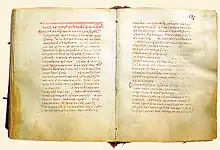 Dionysiou monastery, codex 90, a 13th-century manuscript containing selections from Herodotus, Plutarch and (shown here) Diogenes Laërtius
Dionysiou monastery, codex 90, a 13th-century manuscript containing selections from Herodotus, Plutarch and (shown here) Diogenes Laërtius Chrysobull of Alexios III of Trebizond
Chrysobull of Alexios III of Trebizond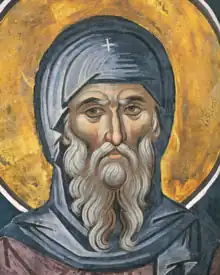 A Cretan style icon of Anthony the Great in the katholikon of Dionysiou Monastery on Mount Athos, painted by an unidentified iconographer in the 14th century.
A Cretan style icon of Anthony the Great in the katholikon of Dionysiou Monastery on Mount Athos, painted by an unidentified iconographer in the 14th century.
References
- Speake, Graham (2014). Mount Athos: renewal in paradise. Limni, Evia, Greece: Denise Harvey. pp. 74–75. ISBN 978-960-7120-34-2. OCLC 903320491.
- A. E. Bakalopulos (1973). History of Macedonia, 1354-1833. [By] A.E. Vacalopoulos. p. 166.
At the end of the 15th century, the Russian pilgrim Isaiah relates that the monks support themselves with various kinds of work including the cultivation of their vineyards....He also tells us that nearly half the monasteries are Slav or Albanian. As Serbian he instances Docheiariou, Grigoriou, Ayiou Pavlou, a monastery near Ayiou Pavlou and dedicated to St. John the Theologian (he no doubt means the monastery of Ayiou Dionysiou), and Chilandariou. Panteleïmon is Russian, Simonopetra is Bulgarian, and Karakallou and Philotheou are Albanian. Zographou, Kastamonitou (see fig. 58), Xeropotamou, Koutloumousiou, Xenophontos, Iveron and Protaton he mentions without any designation; while Lavra, Vatopedi (see fig. 59), Pantokratoros, and Stavronikita (which had been recently founded by the patriarch Jeremiah I) he names specifically as being Greek (see map 6).
- "Saint Joseph of Dionysiou". Orthodox Church in America. 2022-02-17. Retrieved 2022-08-28.
- Cavarnos, Constantine (1999). Blessed elder Gabriel Dionysiatis (1886-1983): remarkable confessor and spiritual guide, profound analyst of twentieth century society, inspiring writer on many vital topics, and for forty years Abbot of the Monastery of Dionysiou at the Holy Mountain of Athos. Belmont, MA, U.S.A.: Institute for Byzantine and Modern Greek Studies. ISBN 1-884729-47-9. OCLC 42924301.
- Cavarnos, Constantine (1999-09-01). "Modern Orthodox Saints (1886-1993)". Goodreads. Retrieved 2022-08-26.
- Sanidopoulos, John (2004-02-27). ""Spiritual Invocation" by Elder Gabriel Dionysiatis". www.johnsanidopoulos.com. Retrieved 2022-08-26.
- "Elder Haralambos of Dionysiou". Greek Orthodox Christian Society. 2017-03-19. Retrieved 2022-08-28.
- "Relics of Elder Charalambos of Dionysiou, spiritual child of St. Joseph the Hesychast, exhumed". OrthoChristian.Com. 2021-07-01. Retrieved 2022-08-28.
